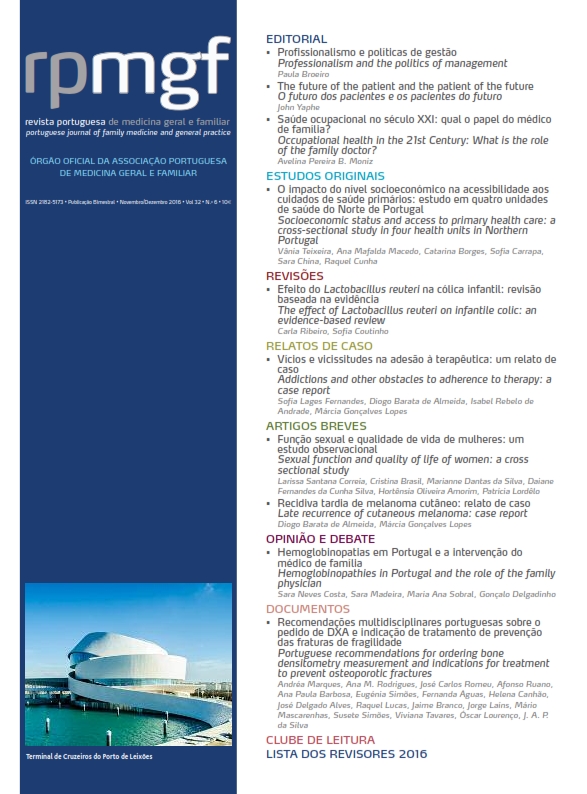Sexual function and quality of life of women: a cross sectional study
DOI:
https://doi.org/10.32385/rpmgf.v32i6.11961Keywords:
Sexual Dysfunction, Quality of Life, Women, Physical ActivityAbstract
Objective: To compare the relationship between sexual function and quality of life (QOL) in women. Type of study: Cross-sectional study. Setting: Bahia, Brazil Participants: High school educated women who were members of a fitness club. Methods: Sexually active non-pregnant women between 18 and 60 years of age were invited to participate in this study. A questionnaire on sociodemographic and clinical information was administered along with the Female Sexual Function Index. Quality of life was evaluated using the SF-36 questionnaire. SF-36 scores of women with and without sexual were compared using the independent t test. Results: The sample included 375 physically active women with a mean age of 34.6±10.0 years. Sexual dysfunction was found in 21.1%. In all domains of the SF-36 women with dysfunction had lower mean scores (p < = 0.01 for emotional aspects and p < 0.01 for other domains). We observed differences in mean scores in mental health, physical, emotional aspects and social aspects respectively, (59.6±18.7), (72.6±33.1), (67.1±38.7) and (69.2±22.8) for women with sexual dysfunction and in the median scores (72.1±16.8), (85.1±26.6), (78.6±34.4) and (80.7±21.9) for women with adequate sexual function (p < 0,01 for all). Conclusion: Sexual Dysfunction had a negative impact on QOL in women in this population.Downloads
Downloads
Published
Issue
Section
License
The authors will assign to the RPMGF the sole right to publish and distribute the content of the manuscript specified in this declaration via physical, electronic, broadcasting or any other medium that may come into existence. They also grant the RPMGF the right to use and exploit this manuscript, in particular by assigning, selling or licensing its content. This permission is permanent and takes effect from the moment the manuscript is submitted, has the maximum duration allowed by applicable Portuguese or international law and is of worldwide scope. The authors further declare that this assignment is made free of charge. If the RPMGF informs the authors that it is not going to publish their manuscript, the exclusive assignment of rights ceases forthwith.
The authors authorise the RPMGF (or any entity it may appoint) to act on their behalf when it believes that copyright may have been infringed.





